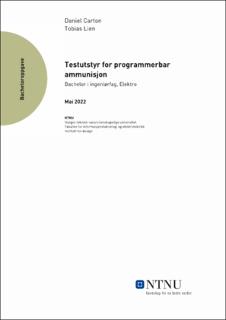Testutstyr for programmerbar ammunisjon
Abstract
Denne rapporten omhandler utvikling, konstruksjon og testing av testutstyr for programmerbar ammunisjon, en bacheloroppgave gitt av Nammo AS. Hovedmålet med oppgaven var å konstruere en robust løsning som inneholdte støtte for en rekke funksjonsbehov gitt fra oppgavegiver. Oppgaven inneholdte også krav om at det skulle være mulig å bruke testutstyret ute på testområder. Derfor ble det satt krav til at systemet skulle inneholde et batterisystem med mulighet til å kobles på nettstrøm, i tillegg at innkapslingen skulle være vannsikkert. Testutstyret skulle ta imot og behandle telemetridata sendt ut med ammunisjon og eksportere det til gitte format. I tillegg til telemetrien var det også behov for triggersignal for å signalisere start av datainnsamling.
Hele løsningen ble konstruert i en solid koffert med eget batterisystem, selvutviklet kretskort og grensesnittpanel for brukerinput og inn- og utganger. Systemet er basert rundt en ESP32 mikrokontroller som styrer og behandler dataen mottatt fra ammunisjonen. Testutstyret bruker en rekke inn- og utganger som BNC, RS-422, RS-232 og SD-kort for eksportering av data. Det ferdig konstruerte testutstyret ble testet for implementerte funksjoner, samt den mekaniske løsningen.
Testene utført viste lovende resultater i forhold til hva som var forventet og ønsket. Derimot kan det ikke sies at testutstyret er et ferdig utviklet produkt, da systemet fortsatt mangler noen funksjoner. Nåværende løsning har maskinvaren nødvendig slik at videre arbeid skal kun være videre programmering. Prosjektet konkluderes med at selv om løsningen ikke er fullstendig ferdig implementert, er nåværende testutstyr et godt grunnlag for videre arbeid og utvikling. This report deals with the development, construction, and testing of testing equipment for programmable ammunition, a bachelor's thesis given by Nammo AS. The main goal of the thesis was to construct a robust solution that included support for several functional needs given by the thesis provider. The thesis also included requirements that it should be possible to use the test equipment out in the field. Therefore, it was required that the system should contain a battery system with the option of connecting to mains power, in addition to the enclosure being waterproof. The testing equipment's purpose is to receive and process telemetry data sent out with ammunition and export it to a given format. In addition to telemetry, there was also need for a trigger signal to signal the start of data collection.
The entire solution was constructed in a solid case with its own battery system, self-developed circuit board and interface panel for user input and also the inputs and outputs to the system. The system itself is based around an ESP32 microcontroller that controls and processes the data received from the ammunition. The testing equipment uses a number of inputs and outputs such as BNC, RS-422, RS-232 and SD cards for data export. The finished testing equipment was tested for the implemented functions as well as the mechanical solution.
The tests performed showed promising results in relation to what was expected and desired. On the other hand, it cannot be said that the testing equipment is a fully developed product, as the system still lacks some functionality. The current solution does have the hardware necessary so that further work will only require further programming. The project concludes that even though the solution has not been fully implemented, the current testing equipment is a good basis for further work and development.
